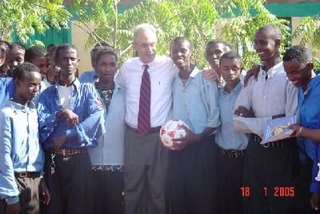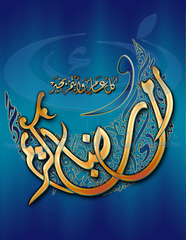WHY ISLAM IS THE FASTEST GROWING RELIGION IN THE WORLD
ISLAM GROWING THE FASTEST IN THE WORLD
Why?
Islam, a religion that was for centuries believed to have been ‘spread by the sword’ is currently the fastest growing religion in the United States and in the world.
Adherents to the Islamic faith number 1.5 billion worldwide. And growing… In the United States, where Muslims number over 10 million, the Islamic faith has in many estimates surpassed Judaism and is believed to be the second largest religion in America after Christianity.
While part of the rise in the population of Muslims in the United States is due to immigration, the phenomenal growth of Islam in the past 10 years has come from an increasing number of Americans converting to Islam from other religions especially the women.
Let us go straight to statistics and what the media is saying about ISLAM's growth WHAT THE MEDIA and PERSONALITIES SAY ABOUT ISLAM
"Islam is the fastest-growing religion in America, a guide and pillar of stability for many of our people..." HILLARY RODMAN CLINTON, Los Angeles Times, May 31, 1996, p.3
Already more than a billion-people strong, Islam is the world’s fastest-growing religion. ABCNEWS, Abcnews.com
"Islam is the fastest-growing religion in the country." NEWSDAY, March 7, 1989, p.4
"Islam is the fastest-growing religion in the United States..." NEW YORK TIMES, Feb 21, 1989, p.1
"Moslems are the world's fastest-growing group..." USA TODAY, The populationreferance bureau, Feb. 17, 1989, p.4A
"Muhummed is the most successful of all Prophets and religious personalities. " Encyclopedia Britannica
"There are more Muslims in North America then Jews Now." Dan Rathers, CBSNEWS
"Islam is the fastest growing religion in North America." TIMES MAGAZINE
"Islam continues to grow in America, and no one can doubt that!" CNN, December 15, 1995
"The religion of Islam is growing faster than any other religion in the world." MIKE WALLACE, 60 MINUTES
"Five to 6 million strong, Muslims in America already outnumber Presbyterians, Episcopalians, and Mormons, and they are more numerous than Quakers, Unitarians, Seventh-day Adventists, Mennonites, Jehovah's Witnesses, and Christian Scientists, combined. Many demographers say Islam has overtaken Judaism as the country's second-most commonly practiced religion; others say it is in the passing lane." JOHAN BLANK, USNEWS (7/20/98)
"In fact, religion experts say Islam is the second-largest religion in the United States... Islam has 5 million to 6 million members, followed by Judaism, with approximately 4.5 million..... And Islam is believed to be fastest-growing religion in the country, with half its expansion coming from new immigrants and the other half from conversions." By ELSA C. ARNETT Knight-Ridder News Service
WHAT SCIENTISTS ARE ALSO SAYING
Professor Keith Moore, one of the world’s prominent scientists of anatomy and embryology. University of Toronto, Canada "It has been a great pleasure for me to help clarify statements in the Qur’aan about human development. It is clear to me that these statements must have come to Muhammad from Allah, or Allah, because almost all of this knowledge was not discovered until many centuries later. This proves to me that Muhammad must have been a messenger of Allah."
"But Islam has a still further service to render to the cause of humanity. It stands after all nearer to the real East than Europe does, and it possesses a magnificent tradition of inter-racial understanding and cooperation. No other society has such a record of success uniting in an equality of status, of opportunity, and of endeavours so many and so various races of mankind . . . Islam has still the power to reconcile apparently irreconcilable elements of race and tradition. If ever the opposition of the great societies of East and West is to be replaced by cooperation, the mediation of Islam is an indispensable condition. In its hands lies very largely the solution of the problem with which Europe is faced in its relation with East. If they unite, the hope of a peaceful issue is immeasurably enhanced. But if Europe, by rejecting the cooperation of Islam, throws it into the arms of its rivals, the issue can only be disastrous for both." --H.A.R. Gibb, WHITHER ISLAM, London, 1932, p. 379.
"It (Islam) replaced monkishness by manliness. It gives hope to the slave, brotherhood to mankind, and recognition of the fundamental facts of human nature." --Canon Taylor, Paper read before the Church Congress at Walverhamton, Oct. 7, 1887; Quoted by Arnoud in THE PREACHING OF ISLAM, pp. 71-72.
"The founder of twenty terrestrial empires and of one spiritual empire, that is Muhammed. As regards all standards by which human greatness may be measured, we may well ask, is there any man greater than he? " Lamartine, Historie de la Turquie, Paris 1854, Vol. 11 pp. 276-2727
"If a man like Muhamed were to assume the dictatorship of the modern world, he would succeed in solving its problems that would bring it the much needed peace and happiness." George Bernard Shaw
"How, for instance, can any other appeal stand against that of the Moslem who, in approaching the pagan, says to him, however obscure or degraded he may be 'Embrace the faith, and you are at once equal and a brother.' Islam knows no color line." (S. S. Leeder, VEILED MYSTERIES OF EGYPT)
Professor Siaveda , He is also one of the most famous scientists in the world. "I think it seems to me very, very mysterious, almost unbelievable. I really think if what you have said is true, "
Professor William W. Hay is one of the best known marine scientists in the United States. satellite photography and emote-sensing techniques. Professor Hay replied: I find it very interesting that this sort of information is in the ancient scripture of the Holy Qur’aan, and I have no way of knowing where they would come from, but I think it is extremely interesting that they are there and that this work is going on to discover it, the meaning of some of the passages. Professor Hay: Well, I would think it must be the divine being!
Professor Yushudi Kusan: Director of the Tokyo Observatory, "I can say, I am very mush impressed by finding true astronomical facts in the Qur’aan."
Professor Alfred Kroner who is one of the world’s most famous geologists "Thinking about many of these questions and thinking where Muhammad came from, he was after all a bedouin. I think it is almost impossible that he could have known about things like the common origin of the universe, because scientists have only found out within the last few years with very complicated and advanced technological methods that this is the case."
Dr. T.V.N. Persaud is a Professor of Anatomy and Head of the Department of Anatomy, and a professor of Pediatrics and Child Health, University of Manitoba, Winnipeg, Manitoba, Canada. He is the author or editor of 25 books, and has published over 181 scientific papers. In 1991, he received the most distinguished award presented in the field of anatomy in Canada. "It seems to me that Muhammad was a very ordinary man. He could not read or write. In fact, he was illiterate. We are talking about 1400 years ago. You have someone who was illiterate making profound pronouncement and statements and are amazingly accurate about scientific nature. I personally cannot see how this could be mere chance. There are too many accuracy’s and, like Dr. Moore, I have no difficulty in my mind in concerning that this is a divine inspiration or revelation which led him to these statements."
Joe Leigh Simpson, Professor of Obstetrics and Gynecology at the North Western University in Chicago in the United States of America. Professor Simpson said: It follows, I think, that not only is there no conflict between genetics and religion, but in fact religion can guide science by adding revelation to some traditional scientific approaches. That there exists statements in the Qur’aan shown by science to be valid, which supports knowledge in the Qur’aan having been derived from Allah.
Professor Palmer a scientist from the U.S. "We need research into the history of early Middle Eastern oral traditions to know whether in fact such historical events have been reported. If there is no such record, it strengthens the belief that Allah transmitted through Muhammad bits of his knowledge that we have only discovered for ourselves in recent times. We look forward to a continuing dialogue on the topic of science in the Qur’aan in the context of geology. Thank you very much."
Professor Tagata Tagasone, formerly Head of the Department of Anatomy and Embryology at the University of Shiang Mai in Thailand. He is now the Dean of the College of the Medicine at the University. From my studies and from what I have learned throughout this conference, I believe that everything that has been recorded in the Qur’aan 1400 years ago must be the truth, that can be proved by the scientific means. Since the Prophet Muhammad could neither read nor write, Muhammad must be a messenger who relayed this truth which was revealed to him as an enlightenment by the One Who is an eligible Creator. This Creator must be Allah, or Allah. Therefore, I think this is the time to say ‘Laa ilaaha illallah’, that there is no Allah to worship except Allah, ‘Muhammad Rasool Allah’, Muhammad is messenger of Allah...
Professor Armstrong, Scientist works at NASA, "I am impressed that how remarkably some of the ancient writings seem to correspond to modern and recent Astronomy. There may well have to be something beyond what we understand as ordinary human experience to account for the writings that we have seen."
Professor Dorja Rao, "It is difficult to imagine that this type of knowledge was existing at that time, around 1400 years back. May be some of the things they have simple idea about, but do describe those things in great detail is very difficult. So, this is definitely not a simple human knowledge."
ISLAM AND THE RIGHTS OF WOMEN:
Indeed, Islam is the only way of life that gives women their full rights. Each and every one of the following points is a real and true teaching of Islam, based on the Holy Qur'an and on the tradition of the prophet Muhammad (peace and blessings be upon him):
- Islam declared women and men equal in rights and duties.
- Islam condemned pre-Islamic practices degrading and oppressing women.
- The same injunctions and prohibitions of Islam equally apply to both sexes.
- Islam gave woman the right of inheritance and the right of individual independent ownership unhampered by father, husband, brother, son or anyone else.
- Islam gave women the right to accept or reject a marriage proposal free from pressure, and by mutual agreement to specify in the marriage contract that she has the right to divorce (if she misses that option she has the right to seek court divorce if she deems the marriage to have failed beyond repair).
- Islam does not require woman to change her name at marriage.
- Islam protects the family and condemns the betrayal of marital fidelity. It recognizes only one type of family: husband and wife united by authentic marriage contract.
- "Heaven is at the feet of mothers", is a basic Islamic teaching (which means: if you're kind to your mother, if you obey her, if you don't 'forget' her when she's old... then God (Allah in Arabic) will grant you Heaven (Paradise)).
- "The best of you are the kindest to their wives and I am your best to mine", is a teaching by prophet Muhammad (peace and blessings be upon him).
- Islam enjoins sounds morality in thinking, behavior and appearance. Dress fashions and social patterns that reduce woman to a sex object and exploit her as such are not acceptable to Islam.
- The observance of chastity and moral standards is equally demanded by Islam from both men and women. "Women are the siblings of men", is a saying of prophet Muhammad (peace and blessings be upon him).
Let me sum up with this QURANIC chapter about forced conversion to ISLAM HOLY QURAAN Chapter 2:256
"There is no compulsion in religion(ISLAM). Verily, the Right Path has become distinct from the wrong path. Whoever disbelieves in Taghut and believes in Allah, then he has grasped the most trustworthy handhold that will never break. And Allah is All-Hearer, All-Knower"
And Allah knows best.



